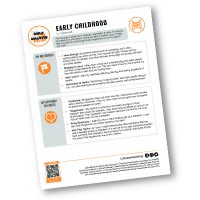
Early Childhood
(3 - 5 years old)
Families play a critical role in helping to reestablish a sense of normalcy and safety for a child before, during and after a disaster occurs. Please take a moment to read through these suggestions on how to support your child.
My Milestones
- I Have Energy: My physical activity level is increasing, and I need opportunities to be active so that I can rest well at night. Please limit my screen time (TV, tablets, and other devices). Encourage me to play with toys and other people.
- Empathy is Hard: I often have a hard time understanding that other people can think or feel differently than me. This can make it hard for me to share my toys with others or feel sorry for hurting them.
- How I Learn: I learn by watching, listening, playing, and asking questions of people.
- Awareness of Others: Mimicking or copying what I see other people doing is fun. I am also starting to feel emotions like guilt, shame, and embarrassment.
My Response to Stress
- Clinginess: Being extra clingy can show you that I need you to help me feel safe, cared for, and loved. I may cry more when we are apart now compared to before the disaster occurred.
- “Regression”: My actions or behaviors may seem younger or more “babyish” than usual (for example, I may have potty accidents or suck on my thumb again). This “regression” can happen because it is hard for me to do “big kid” skills when my life is stressful.
- Risky Behaviors: I might try new or risky things to get your attention. I may also hide things from you and/or disobey more often.
- New Play Topics: As I play, I might pretend-play about situations that are about stressful events or disasters. It is normal for my play scenarios to switch back and forth from intense or serious topics to my typical, silly types of play. It is okay if this happens for one or two months.
How Adults Can Help
- Consistent Routines: Please try to keep our daily routines normal and consistent, especially regarding time to play, eat, and sleep.
- Reassure Me: Give me extra snuggles, attention, and quality time together through playing and reading children’s books.
- Stay with Me: I may be afraid of being away from you now, especially soon after the event. It might be too hard for me to go somewhere without you even for a few hours. I may be stressed even when you go to the bathroom and I cannot see where you are. My increased clinginess may last for a few weeks to months.
- Please be Honest: When I ask you questions about the event, please ask me what I already know about what happened. Please answer my questions truthfully, but avoid graphic details and use simple, child-friendly language. Carefully monitor my access to media, news, YouTube, and the internet. Seeing the news or those images can be scary and confusing, because it can look to me like the event is still happening.
- Do Not Worry: It is okay if my play starts to look like the event that happened, or I am showing more “babyish” behaviors like wanting to suck on my pacifier again, for example. That is a typical response to stress or disaster in children.
- Self-Care: Please take care of yourself. Stay rested, eat well, and drink water. When you are well cared for, then you can take even better care of me.
When to Seek Professional Help
- Regression Continues: Please talk to a healthcare professional if my “regression” (“babyish” behaviors) does not get better after a few weeks or months.
- Tough Questions: If you are not sure how to answer my questions about the event, please talk to a healthcare professional for advice about how to converse with me in an appropriate way about what happened.
- Play Remains Different: My play should go back to my usual types of playing after a few weeks to months. If it does not, please talk to a healthcare professional.
About the Authors
Created in collaboration with: Audrey Haugen*, MS, CCLS, and the Child Life Disaster Relief Resource Sub-Committee
Child Life Disaster Relief Resource Sub-Committee:
- Audrey Haugen, MS, CCLS (Chairperson)
- Jean Cooper, CLS, LCSW (CLDR Executive Director)
- Amber Hill, MS, CCLS
- Jordann Hager, MS, CCLS, CPST
- Jennie Kriznik, MPS, CCLS
- Corey Ford, MS, RBT
- Tessa Randolph, BS, CCLS, CGSS
